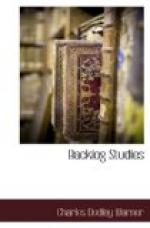Straightway I alighted at the gate,—a dismal crevice hewn into the dripping rock. The gate was wide open, and there sat-I knew him at once; who does not?—the Arch Enemy of mankind. He cocked his eye at me in an impudent, low, familiar manner that disgusted me. I saw that I was not to be treated like a gentleman.
“Well, young man,” said he, rising, with a queer grin on his face,” what are you sent here for?
“For using tobacco,” I replied.
“Ho!” shouted he in a jolly manner, peculiar to devils, “that’s what most of ’em are sent here for now.”
Without more ado, he called four lesser imps, who ushered me within. What a dreadful plain lay before me! There was a vast city laid out in regular streets, but there were no houses. Along the streets were places of torment and torture exceedingly ingenious and disagreeable. For miles and miles, it seemed, I followed my conductors through these horrors, Here was a deep vat of burning tar. Here were rows of fiery ovens. I noticed several immense caldron kettles of boiling oil, upon the rims of which little devils sat, with pitchforks in hand, and poked down the helpless victims who floundered in the liquid. But I forbear to go into unseemly details. The whole scene is as vivid in my mind as any earthly landscape.
After an hour’s walk my tormentors halted before the mouth of an oven,—a furnace heated seven times, and now roaring with flames. They grasped me, one hold of each hand and foot. Standing before the blazing mouth, they, with a swing, and a “one, two, three....”
I again assure the reader that in this narrative I have set down nothing that was not actually dreamed, and much, very much of this wonderful vision I have been obliged to omit.
Haec fabula docet: It is dangerous for a young man to leave off the use of tobacco.
FIFTH STUDY
I
I wish I could fitly celebrate the joyousness of the New England winter. Perhaps I could if I more thoroughly believed in it. But skepticism comes in with the south wind. When that begins to blow, one feels the foundations of his belief breaking up. This is only another way of saying that it is more difficult, if it be not impossible, to freeze out orthodoxy, or any fixed notion, than it is to thaw it out; though it is a mere fancy to suppose that this is the reason why the martyrs, of all creeds, were burned at the stake. There is said to be a great relaxation in New England of the ancient strictness in the direction of toleration of opinion, called by some a lowering of the standard, and by others a raising of the banner of liberality; it might be an interesting inquiry how much this change is due to another change,—the softening of the New England winter and the shifting of the Gulf Stream. It is the fashion nowadays to refer almost everything to physical causes, and this hint is a gratuitous contribution to the science of metaphysical physics.




